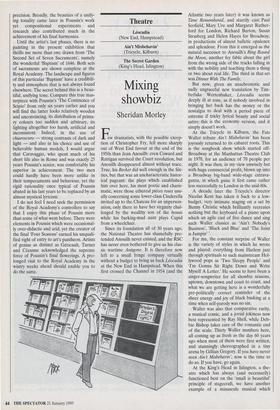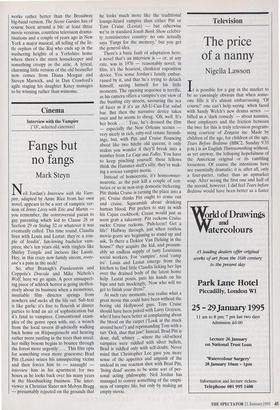Theatre
Leocadia (New End, Hampstead) Ain't Misbehavin' (Tricycle, Kilburn) The Secret Garden (King's Head, Islington)
Mixing showbiz
Sheridan Morley Few dramatists, with the possible excep- tion of Christopher Fry, fell more sharply out of West End favour at the end of the 1950s than Jean Anouilh: even Coward and Rattigan survived the Court revolution, but Anouilh disappeared almost without trace. True, his Becket did well enough in the Six- ties, but that was an uncharacteristic histor- ical pageant: the plays which established him over here, his most poetic and charis- matic, were those ethereal pieces roses usu- ally concerning some lower-class Cinderella invited up to the Chateau for an imperson- ation, only there to have her virginity chal- lenged by the wealthy son of the house while his barking-mad aunt plays Cupid from a wheelchair.
Since its foundation all of 30 years ago, the National Theatre has shamefully pre- tended Anouilh never existed, and the RSC has never even bothered to give us his clas- sic wartime Antigone. It is therefore now left to a small fringe company virtually without a budget to bring us back Leocadia at the New End in Hampstead. When this first crossed the Channel in 1954 (and the Atlantic two years later) it was known as Time Remembered, and starrily cast: Paul Scofield, Mary Ure and Margaret Ruther- ford for London, Richard Burton, Susan Strasberg and Helen Hayes for Broadway, in productions of almost balletic opulence and splendour. From this it emerged as the natural successor to Anouilh's Ring Round the Moon, another fey fable about the girl from the wrong side of the tracks falling in with the nobility and teaching them a thing or two about real life. The third in that set was Dinner With The Family.
But now, given an anachronistic and sadly ungraceful new translation by Tim- berlake Wertenbaker, Leocadia seems deeply ill at ease, as if nobody involved in bringing her back has the money or the nostalgia to deal with a period piece of extreme if tricky lyrical beauty and social satire: this is the economy version, and it simply doesn't work.
At the Tricycle in Kilburn, the Fats Waller tribute Ain't Misbehavin' has been joyously returned to its cabaret roots. This is the songbook show which started off- Broadway at the Manhattan Theatre Club in 1978, for an audience of 70 people per night. It was then, in my view unwisely but with huge commercial profit, blown up into a Broadway big-band wide-stage extrava- ganza, in which guise it first came rather less successfully to London in the mid-80s.
A decade later the Tricycle's director Nicolas Kent has taken it back to a low- budget, very intimate staging on a set by Bunny Christie which brilliantly recreates nothing but the keyboard of a piano upon which an agile cast of five dance and sing such Waller classics as 'Ain't Nobody's Business', 'Black and Blue' and 'The Joint is Jumpin".
For me, the constant surprise of Waller is the variety of styles in which he wrote and played: everything from Harlem jazz through spirituals to such mainstream Hol- lywood pops as 'Two Sleepy People' and `I'm Gonna Sit Right Down and Write Myself A Letter.' He seems to have been a singer-songwriter for all showbiz seasons, uptown, downtown and coast to, coast, and what we are getting here is a wonderfully pre-politically correct reminder of the sheer energy and joy of black busking at a time when self-parody was no sin.
Waller was also that comparative rarity, a musical comic, and a jovial jokiness now best represented by Ray Shell, while Deb- bie Bishop takes care of the romantic end of the scale. Thirty Waller numbers here, all coming up as fresh as the day 60 years ago when most of them were first written, and stunningly choreographed in a tiny arena by Gillian Gregory. If you have never seen Ain't Misbehavin', now is the time to do so. If you have, go again.
At the King's Head in Islington, a the- atre which has always (and necessarily) functioned best on the 'small is beautiful' principle of stagecraft, we have another example of a minuscule musical which works rather better than the Broadway big-band version. The Secret Garden has of course been around a bit: at least three movie versions, countless television drama- tisations and a couple of years ago in New York a major musical, all telling of the lit- tle orphan of the Raj who ends up in the wuthering heights of a Yorkshire home where there's the stern housekeeper and something creepy in the attic. A lyrical, charming little version of the old bestseller now comes from Diana Morgan and Steven Marwick, and in Dan Crawford's agile staging his daughter Katey manages to be winning rather than winsome.



























































 Previous page
Previous page